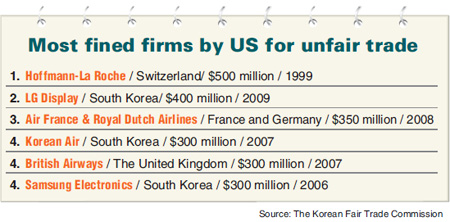Korea 2nd on global cartel fines
 Korean firms have been slapped with a total fine of 2.4 trillion won ($2.1 billion) by overseas anti-trust regulators since 2000 for price-fixing, the Fair Trade Commission said Tuesday.
Korean firms have been slapped with a total fine of 2.4 trillion won ($2.1 billion) by overseas anti-trust regulators since 2000 for price-fixing, the Fair Trade Commission said Tuesday.
They had to pay nearly $1.27 billion in fines in the United States, and four out of 10 non-American businesses that had to pay high fines for unfair trade were Korean, according to data compiled by the country’s anti-trust regulator.
LG Display, a leading panel maker, came second on the list of 10, paying a fine of $400 million in 2009 for fixing the price of its thin-film transistor liquid crystal display.
The country’s flagship carrier Korean Air ranked fourth along with Samsung Electronics, each paying $300 million in fines for fixing prices of transportation in 2007, and dynamic random access memory (DRAM) chips in 2006, respectively.
Hynix Semiconductor, which was recently acquired by SK Group and renamed SK-hynix, came ninth with a punitive fine of $185 million slapped on it in 2007 for fixing DRAM prices on the U.S. market.
In Europe, five firms — Samsung Electronics, Hynix, LG Display, CJ, and Daesang — had to pay fines totaling 434 million euro (some 652 billion won) on charges of breaching the European Union’s fair trade regulations.
In Canada, CJ was fined CAD$175,000 (200 million won) in 2005 for fixing prices of its seasoning products. The Japanese anti-trust regulator slapped a fine of 1.5 billion yen (20 billion won) on Samsung SDI and LG Display in 2009 for their price-fixing of cathode-ray tubes.
“The number of Korean firms punished for unfair trading has increased since the early 2000s,” said Kim Jae-shin, director of the cartel policy division at the Fair Trade Commission (FTC).
“This was because more countries began to tighten their monitoring on anti-trust practices perpetrated by foreign companies.”
Such violations of anti-trust rules can cause serious damage to a company’s bottom line as well as its corporate image, he said.
“Many violated rules to maximize profit. However, some companies were proven to have made unintentional violations due to a lack of knowledge about anti-trust regulations in their target markets.”
The FTC has annually hosted a briefing session focused on anti-trust regulations since 2010 to share the latest trends and knowledge about the issue with Korean export firms.
On Tuesday, the FTC hosted a session in Tokyo, where more than 300 Korean firms are in operation. Some 150 executives from 50 companies attended the session, holding discussion with officials from the Japanese anti-trust watchdog.
Officials of the FTC and their Japanese counterpart will hold a bilateral meeting today, during which they will discuss ways to strengthen cooperation to crack down on anti-trust practices. <Korea Times/Park Si-soo>





















































